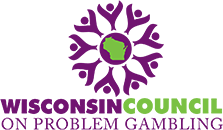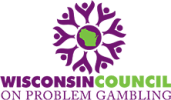Jim Harrison BS, MS, LPC, CSAC, ICGC-II, BACC
Cornerstone Counseling Services, Inc.
The Wisconsin Council on Problem Gambling Board of Directors
Ever since the beginning of time, gambling has been a part of our culture. It can be a form of fun, pleasure, and entertainment. Gambling has also been the cause of grief, pain, and devastation for many individuals as well as their families and other significant people in their lives.
The objective of this article is to provide education, awareness, and resources on social, problematic, and pathological gambling issues, while maintaining complete neutrality on the issue of legalized gambling. It does not take a stand on supporting or condemning gambling or gambling related situations. It is designed to help the family as well as the gambler to deal with emotional, financial, and spiritual consequences of gambling in a non-judgmental, non-condemning, and non-shaming manner.
According to Robert Custer and Harry Milt, in their book When Luck Runs Out: Help for Compulsive Gamblers and Their Families, there are approximately 6 categories of gamblers. These include the following:
THE SOCIAL GAMBLER: This is an individual who gambles occasionally. He or she only gambles for fun and sticks to their limit. Their gambling has no negative effect on their families, friends, work, or society in general. Their gambling also has no negative effect on their own physical or mental health.
THE SERIOUS SOCIAL GAMBLER: This is an individual who gambles regularly. To them, gambling is a hobby or avocation. Like a social gambler, they usually do not spend more time or money than they can afford. They also usually stick to their limits. There may or may not be concerns about their gambling by others, but it normally has no negative effect on themselves or other significant people or activities in their lives.
THE PROFESSIONAL GAMBLER: To this individual, gambling is a profession and way of life. It is his or her way of earning a living. To them, gambling is a business, not for fun. It is very rare to encounter a professional gambler in a counseling situation.
THE PROBLEM GAMBLER: This individual is beginning to have problems as a result of their gambling. These problems may be related to finances, relationships, work, school, or other significant facets of their lives.
THE PATHOLOGICAL OR COMPULSIVE GAMBLER: This individual has substantial life problems related to their gambling. There usually are major financial, relationship, work, and social problems. Often there are also legal issues as a result of their behavior.
THE BUNGLER: This is an unofficial category. This individual is sometimes called the “stupid” gambler. They usually play games of skill relying on luck rather than logic and reasoning, i.e. places a stupid bet on favorite colors, numbers, or names. The bungler may or may not have problems related to their gambling.
Of these categories, there are two main types of gamblers; action gamblers and escape gamblers. Action gamblers games of choice require skill, i.e. sports betting, table games, etc. Escape gamblers choose gaming that requires little if any skill, i.e. slot machines, bingo, lottery, etc.
Compulsive gambling has certain features in common with other addictive behaviors. In fact, many problem gamblers also have co-occurring substance abuse problems, specifically alcohol abuse. Other common co-occurring problems may include depression and/or Attention Deficit Disorder (ADD). Problem gamblers may also have an elevated risk for suicidal thoughts and behaviors. Like other addictions, there tends to be an increase in the frequency, intensity, and harm associated with the behavior over time for problem gamblers. The problem gambler may be in the early stages of questioning whether he or she has developed a problem, while others around them are more convinced that is the case.
There are many treatment modalities and interventions that have been shown to be effective for problem gambling. Behavioral approaches include steps such as:
Self-banning: This allows the individual to ban or prevent themselves from entering a casino. This is a contract the individual makes with all state casinos. If one does enter a casino, they could be arrested for trespassing.
Harm reduction: The individual would attempt to set a money limit, not bring a debit card with them, limit the number of times they gamble in a week, month, etc., or not go alone if they do gamble.
Money management: The individual limits access to money by having someone they trust manage and control their finances.
Other therapy modalities include:
Support groups: By attending Gamblers Anonymous (GA), 12-Step meetings, or other support groups, problem gamblers meet and interact with others who have similar issues and receive support in making changes.
Cognitive-behavioral therapy: In this therapy, individuals explore distorted gambling-related beliefs, warning signs and triggers of a relapse, and learn to substitute more effective strategies to cope with negative feelings such as anxiety, depression, boredom, and restlessness.
Medications: Because problematic gambling relates to a cycle of negative mood/tension followed by compulsive gambling behaviors as an attempt to resolve or “self-medicate” those negative emotions, proper pharmacological treatments have been shown to help some problem gamblers. Some of these medications may include opiate antagonists, antidepressants, and mood stabilizers.
As with any other disorder, there is no “cookie cutter” answer to success. However, success is possible. If you or a loved one believes that gambling has developed into a problem, consider completing an assessment with a qualified professional.
Jim Harrison MS, LPC, CSAC, ICGC-II, BACC is an International Certified Gambling Counselor, Level 2 and Board Approved Clinical Consultant. He can be reached at Cornerstone Counseling Services, 10850 West Park Place, Suite 100, Milwaukee, Wisconsin, 53224, 262-789-1191, Extension 191, jlharrisoniii@yahoo.com.
You can also contact:
The Wisconsin Council on Problem Gambling, Inc.
1585 Allouez Ave
Green Bay, WI 54311
Helpline:
1-800-GAMBLE-5 or 1-800-426-2535
Chat Line:
www.wi-problemgamblers.org
Text:
1-920-888-HELP or 1-920-888-4357
Help For Problem Gamblers
Jim Harrison BS, MS, LPC, CSAC, ICGC-II, BACC
Cornerstone Counseling Services, Inc.
The Wisconsin Council on Problem Gambling Board of Directors
Ever since the beginning of time, gambling has been a part of our culture. It can be a form of fun, pleasure, and entertainment. Gambling has also been the cause of grief, pain, and devastation for many individuals as well as their families and other significant people in their lives.
The objective of this article is to provide education, awareness, and resources on social, problematic, and pathological gambling issues, while maintaining complete neutrality on the issue of legalized gambling. It does not take a stand on supporting or condemning gambling or gambling related situations. It is designed to help the family as well as the gambler to deal with emotional, financial, and spiritual consequences of gambling in a non-judgmental, non-condemning, and non-shaming manner.
According to Robert Custer and Harry Milt, in their book When Luck Runs Out: Help for Compulsive Gamblers and Their Families, there are approximately 6 categories of gamblers. These include the following:
THE SOCIAL GAMBLER: This is an individual who gambles occasionally. He or she only gambles for fun and sticks to their limit. Their gambling has no negative effect on their families, friends, work, or society in general. Their gambling also has no negative effect on their own physical or mental health.
THE SERIOUS SOCIAL GAMBLER: This is an individual who gambles regularly. To them, gambling is a hobby or avocation. Like a social gambler, they usually do not spend more time or money than they can afford. They also usually stick to their limits. There may or may not be concerns about their gambling by others, but it normally has no negative effect on themselves or other significant people or activities in their lives.
THE PROFESSIONAL GAMBLER: To this individual, gambling is a profession and way of life. It is his or her way of earning a living. To them, gambling is a business, not for fun. It is very rare to encounter a professional gambler in a counseling situation.
THE PROBLEM GAMBLER: This individual is beginning to have problems as a result of their gambling. These problems may be related to finances, relationships, work, school, or other significant facets of their lives.
THE PATHOLOGICAL OR COMPULSIVE GAMBLER: This individual has substantial life problems related to their gambling. There usually are major financial, relationship, work, and social problems. Often there are also legal issues as a result of their behavior.
THE BUNGLER: This is an unofficial category. This individual is sometimes called the “stupid” gambler. They usually play games of skill relying on luck rather than logic and reasoning, i.e. places a stupid bet on favorite colors, numbers, or names. The bungler may or may not have problems related to their gambling.
Of these categories, there are two main types of gamblers; action gamblers and escape gamblers. Action gamblers games of choice require skill, i.e. sports betting, table games, etc. Escape gamblers choose gaming that requires little if any skill, i.e. slot machines, bingo, lottery, etc.
Compulsive gambling has certain features in common with other addictive behaviors. In fact, many problem gamblers also have co-occurring substance abuse problems, specifically alcohol abuse. Other common co-occurring problems may include depression and/or Attention Deficit Disorder (ADD). Problem gamblers may also have an elevated risk for suicidal thoughts and behaviors. Like other addictions, there tends to be an increase in the frequency, intensity, and harm associated with the behavior over time for problem gamblers. The problem gambler may be in the early stages of questioning whether he or she has developed a problem, while others around them are more convinced that is the case.
There are many treatment modalities and interventions that have been shown to be effective for problem gambling. Behavioral approaches include steps such as:
Self-banning: This allows the individual to ban or prevent themselves from entering a casino. This is a contract the individual makes with all state casinos. If one does enter a casino, they could be arrested for trespassing.
Harm reduction: The individual would attempt to set a money limit, not bring a debit card with them, limit the number of times they gamble in a week, month, etc., or not go alone if they do gamble.
Money management: The individual limits access to money by having someone they trust manage and control their finances.
Other therapy modalities include:
Support groups: By attending Gamblers Anonymous (GA), 12-Step meetings, or other support groups, problem gamblers meet and interact with others who have similar issues and receive support in making changes.
Cognitive-behavioral therapy: In this therapy, individuals explore distorted gambling-related beliefs, warning signs and triggers of a relapse, and learn to substitute more effective strategies to cope with negative feelings such as anxiety, depression, boredom, and restlessness.
Medications: Because problematic gambling relates to a cycle of negative mood/tension followed by compulsive gambling behaviors as an attempt to resolve or “self-medicate” those negative emotions, proper pharmacological treatments have been shown to help some problem gamblers. Some of these medications may include opiate antagonists, antidepressants, and mood stabilizers.
As with any other disorder, there is no “cookie cutter” answer to success. However, success is possible. If you or a loved one believes that gambling has developed into a problem, consider completing an assessment with a qualified professional.
Jim Harrison MS, LPC, CSAC, ICGC-II, BACC is an International Certified Gambling Counselor, Level 2 and Board Approved Clinical Consultant. He can be reached at Cornerstone Counseling Services, 10850 West Park Place, Suite 100, Milwaukee, Wisconsin, 53224, 262-789-1191, Extension 191, jlharrisoniii@yahoo.com.
You can also contact:
The Wisconsin Council on Problem Gambling, Inc.
1585 Allouez Ave
Green Bay, WI 54311
Helpline:
1-800-GAMBLE-5 or 1-800-426-2535
Chat Line:
www.wi-problemgamblers.org
Text:
1-920-888-HELP or 1-920-888-4357
Office: (920) 437-8888

